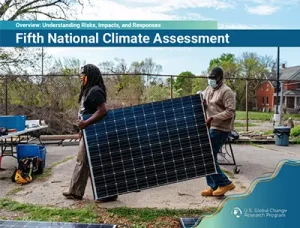 The Fifth National Climate Assessment is the US Government’s preeminent report on climate change impacts, risks, and responses. It is a congressionally mandated interagency effort that provides the scientific foundation to support informed decision-making across the United States.
The Fifth National Climate Assessment is the US Government’s preeminent report on climate change impacts, risks, and responses. It is a congressionally mandated interagency effort that provides the scientific foundation to support informed decision-making across the United States.
The effects of human-caused climate change are already far-reaching and worsening across every region of the United States. Rapidly reducing greenhouse gas emissions can limit future warming and associated increases in many risks. Across the country, efforts to adapt to climate change and reduce emissions have expanded since 2018, and US emissions have fallen since peaking in 2007. However, without deeper cuts in global net greenhouse gas emissions and accelerated adaptation efforts, severe climate risks to the United States will continue to grow.
Quicklinks to Climate Assessment Sections
About the Fifth National Climate Assessment
The Fifth National Climate Assessment (NCA5) provides the scientific foundation to support informed decision-making across the United States. By design, much of the development of NCA5 built upon the approaches and processes used to create the Fourth National Climate Assessment (NCA4), with a goal of continuously advancing an inclusive, diverse, and sustained process for assessing and communicating scientific knowledge on the impacts, risks, and vulnerabilities associated with a changing global climate.
NCA5 was thoroughly reviewed by Federal Government experts, external experts, and the public multiple times throughout the report development process. An expert external review was performed by an ad hoc committee of the National Academies of Sciences, Engineering, and Medicine.
National Climate Assessments synthesize scientific information and evaluate the state of the science on climate change to inform a broad audience of decision-makers across the country. These decision-makers include national, state, local, and Tribal governments, city planners, public health officials, adaptation specialists, nurses, farmers, business owners, community organizers, researchers, water utilities, ecosystem managers, educators, students, the media, and concerned individuals who need to make timely decisions about the climate impacts they are facing. National Climate Assessments make policy-neutral and policy-relevant information accessible and actionable by relying on the expert judgment of the report authors to determine what topics are included in each chapter, to describe what we know and where uncertainties remain, and to clearly communicate the risks, responses, and opportunities associated with climate change.
Sections in the NCA5 include:
Overview
The Overview chapter presents the major findings of the report alongside highlights drawn from across NCA5. This chapter provides a synthesis of material from the underlying report chapters.
Physical Science Chapters
The Climate Trends and Earth Systems Processes chapters assess how climate change affects physical Earth systems, with a focus on the United States, including observations and projections of climate change and discussion of how methods to understand changes in Earth systems have advanced since NCA4, which was released in November 2018.
National Topic Chapters
The national topic chapters summarize current and future risks related to climate change and what can be done to reduce those risks for a variety of societal and economic sectors of the United States. This Assessment builds on the range of topics covered in NCA4 by adding two new chapters: Economics and Social Systems and Justice.
Regional Chapters
The regional chapters assess current and future risks posed by climate change to each of the 10 NCA5 regions. These chapters provide detailed discussions of region-specific challenges, opportunities, and success stories for managing risks and impacts.
Click here to view the Fifth National Climate Assessment.




